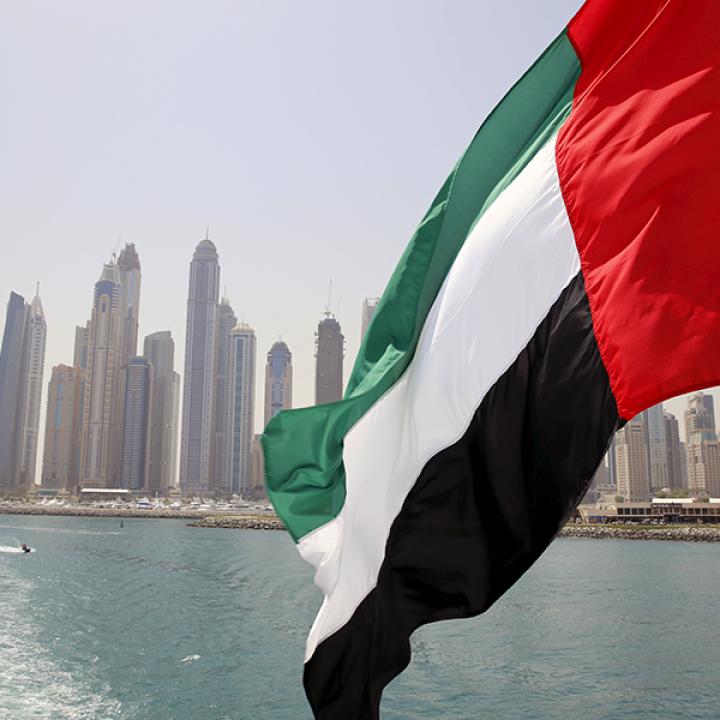

In the past few years, unprecedented economic and security cooperation between Israel and United Arab Emirates has grown given the common threat from Iran. At stake are the Israeli diplomatic mission in Abu Dhabi housed in the renewable energy agency, along with an informal trade office in Dubai. Just last May, Etihad Airways flew the first direct commercial flight from Abu Dhabi to Tel Aviv to provide aid to Palestinians affected by coronavirus. Whatever the flight’s purpose, it has suggested the type of normalization possible going forward. If Israel wants more, meeting Emiratis half-way is a long term investment that Israel should take it into account, if not embrace.
Emiratis still view any movement toward a one-state solution, even a symbolic one, as a dire threat to Emirati national security and a complication of all of their efforts toward regional peace that they have spent the last two decades building upon. They foresee a very unstable one state full of conflicts and a prime propaganda victory—the opportunity of a lifetime for malign Iranian actors in Lebanon, Gaza, and elsewhere around the region.
As such, the UAE has been unprecedentedly public in its warnings to Israelis about the consequences of annexation.
On June 13, the prominent Emirati ambassador to the United States Yousef al-Otaiba made headlines when he published an article in Hebrew in the Israeli national daily newspaper Yedioth Ahronoth. In it, he addressed the Israeli public directly on annexation and its implications on jeopardizing relations with the Arab world, a bolder move than the Jordanian or Egyptian Ambassadors stationed in Tel Aviv dared to make.
This article was followed by a statement written in Hebrew from MFA director Hend al-Otaiba asking the Israeli public to rethink its annexation plans. Two weeks later, she pointedly highlighted signs of normalization between the two states by tweeting “two private companies in UAE sign an agreement with two companies in Israel to develop research technology to fight COVID-19.” Moreover, Anwar Gargash—Minister of State for Foreign Affairs—became the highest ranking Arab official to address the American Jewish Committee annual conference last month, where he talked openly about the potential of peace with Israel.
These public statements reflect an extant trend: Emirati public servants have not been shy about reaching out to both Israel and the Jewish world openly on social media even before annexation became a pressing issue. Last September, Minister of Foreign Affairs and International Cooperation Abdullah bin Zayed tweeted “Shana Tovah” during the Jewish New Year, and this January tweeted about the Holocaust in Arabic.
Now that annexation is on the table for Israeli policymakers, Emiratis at the highest levels are signaling a carrot-and-stick approach to annexation, offering greater normalization on the one hand while emphasizing that such policies will be null if annexation goes forward.
Notably, they are directly refuting Bibi and his right wing allies’ argument inside Israel that annexation would be accepted by many Arab governments, or that these governments no longer care much about Palestinian rights.
These actions also seem to be motivated by the view that the two Arab countries most involved in relations with Israel—Egypt and Jordan—can no longer effectively manage relations with Israel. Also justifying the move—in spite of its huge potential political cost in the region—is that annexation is a direct threat in particular to Jordan, whose monarch is a staunch Emirati ally.
Indeed, Emiratis see annexation as a threat to the regional balance of power. Annexation would provide breathing room for Iran and its proxies while providing soft power for Turkey, where Erdogan is positioning himself as a defender of Jerusalem. Recent messaging in Arabic on returning Hagia Sofia to a mosque emphasized that this was part of “restoring freedom” to the Al-Aqsa mosque in Jerusalem.
Similarly, radical and rejectionist voices across the Middle East will have a new talking point for recruitment—unraveling significant Emirati efforts to combat extremism. Even Emirati allies like Saudi Arabia might deviate from their current trajectory of normalization if annexation pushes forward.
However, while the reasoning behind the political calculus of recent Emirati statements is clear, Emiratis may find their intended audience unreceptive. In Israel, right wing politicians and pro-annexation activists have questioned why annexation—sparked by the Trump peace plan—is different from the U.S. recognition of Jerusalem as Israel’s capital or its acknowledgement of Israeli sovereignty over the Golan Heights. In both cases, the UAE ultimately did not exhibit a response. Yet for Emiratis there is a significant difference between rubber stamping an already extant reality and a new territorial change that threatens the future of a Palestinian state.
Supporters of annexation in Israel are also more likely than Israelis on the left to be skeptical of the Emirati promise of deeper normalization if annexation is not finalized. Right-wing commentators in Israel often point to the ways in which the peace treaties with Egypt and Jordan have failed to yield any further normalization. The Israeli government, controlled by the Likud party position on normalization, has also been shaped by the wars fought against the Arabs and the level of antagonism the state of Israel encountered when it came to existence in 1948.
There is a current consensus among Israelis that the Iranian issue could be capitalized on indefinitely to normalize relations with the UAE, but this is not true. Other pillars of the relationship should be established in order to avoid any future change of UAE policy toward Israel if things moved in a positive direction with Iran. One way to accelerate this is by developing other pillars to seize the current momentum and the joint security interests with the UAE by showing some advancement in the Palestinian arena. This begins by stopping annexation plans, if not even returning to the negotiation table with the Palestinians. History tells us that Israel-Gulf relations could be turned upside down unexpectedly because of the Palestinian issue, as was the case in the 90s after the Oslo accord.



